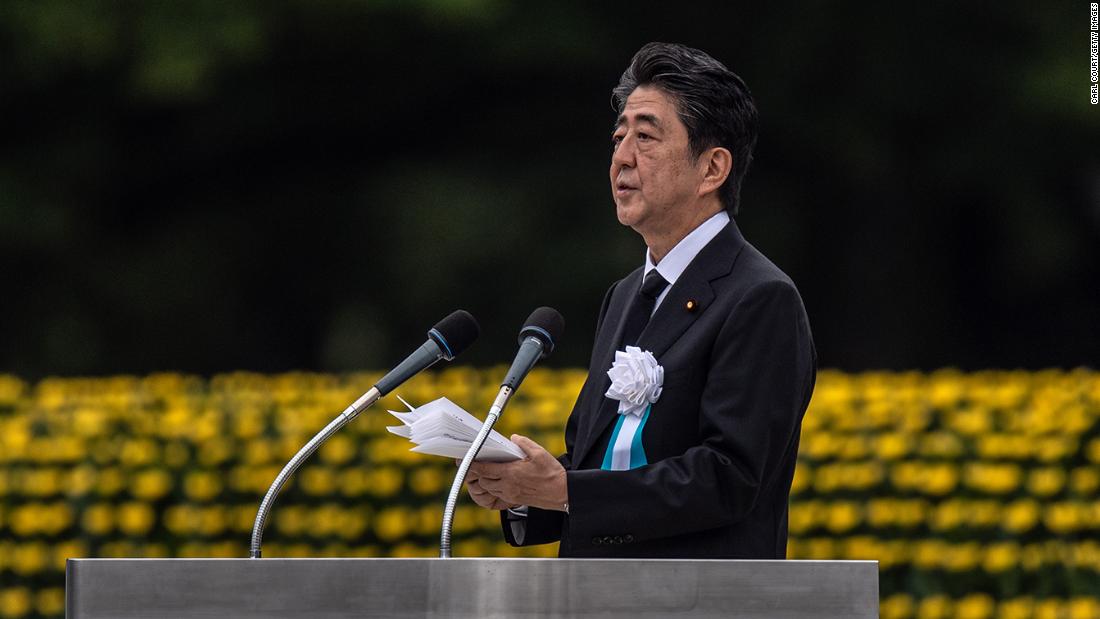
A version of this story first appeared in CNN Business' Before the Bell newsletter. Not a subscriber? You can sign up right here.
The backstory: Abe took office in 2012, promising to reinvigorate the world's third largest economy through massive monetary stimulus, increased government spending and structural economic reforms.
The program has delivered mixed results. Falling prices were vanquished, but inflation has fallen short of the 2% target set by the Bank of Japan. The economy turned in several years of solid growth, but it wasn't able to shift into high gear before the coronavirus struck.
Abe can't pin his program's shortcomings on Haruhiko Kuroda, who took control of the country's central bank in 2013 and won another five-year term in 2018. Under Kuroda's leadership, the Bank of Japan fired a "bazooka" that saw it push interest rates into negative territory, purchase waves of government bonds and gobble up exchange-traded funds.
Why it matters: The buy-everything strategy pushed the Bank of Japan into what some economists regarded as "unconventional" monetary policy. It now looks rather less so.
Major central banks around the world have responded to the economic crisis caused by the coronavirus pandemic by slashing interest rates to new lows, while launching huge quantitative easing programs that resemble those initiated under the banner of Abenomics.
In the United States, the Federal Reserve has cut interest rates to zero but is under pressure to do even more. It's buying $700 billion worth of bonds, providing credit facilities to large companies, purchasing commercial mortgage-backed securities and even splashing out on exchange-traded funds like the Bank of Japan.
Abe's policies are expected to remain in place for the foreseeable future. Analysts expect the prime minister to be replaced by another member of his party, and there's little prospect of a shakeup at the Bank of Japan. The resignation means that Abenomics will end in "name only," said Tom Learmouth of Capital Economics.
A Walmart-TikTok deal could be 'groundbreaking'
What does Walmart (WMT) — an American retailer known for big stores that sell everyday items — want with TikTok, a social media app popular with teens?
At first glance, news that Walmart is joining Microsoft (MSFT) in an attempt to buy the short video platform looks like a head scratcher. But the tie-up actually makes a lot of sense, and could help transform US retail.
Breaking it down: China is experiencing a huge rise in social commerce, which combines social media with frenzied online shopping, our CNN Business colleague Sherisse Pham reports. The Chinese version of TikTok, known as Douyin, is one of several apps in the country that have tapped into the trend.
Know this stat: Social commerce in China was an $186 billion industry last year. Why wouldn't Walmart want to get in on the action?
Investors are showing support for the strategy. Shares of Walmart leaped 4.5% on Thursday and are up another 2% in premarket trading.
"We acknowledge many operating and political details remain unknown, but view the potential acquisition as groundbreaking," Cowen analyst Oliver Chen told clients. "We see TikTok accelerating [Walmart's e-commerce] flywheel."
Remember: President Donald Trump has threatened to ban TikTok in the United States if Chinese parent company ByteDance doesn't sell the app by mid-September.
Even before the Walmart announcement, Microsoft was seen as the lead contender. But Oracle is reportedly interested in buying TikTok, too — and Trump had indicated that such a tie-up might have his blessing.
Wedbush Securities analyst Daniel Ives said he sees a Walmart-Microsoft bid as a slam dunk.
"In our opinion, this is the final piece of the puzzle that ultimately cements Microsoft successfully acquiring TikTok's US operations for likely $35 billion to $40 billion," Ives said in a research note.
Even Corporate America thinks stocks are overvalued
There are plenty of market bulls endorsing the meteoric rise in stocks since March — but Corporate America is decidedly skeptical.
A stunning 84% of Fortune 500 CFOs say the US stock market is overvalued, according to a survey released Thursday by Deloitte, our CNN Business colleague Matt Egan reports. That's up from the 55% who felt that way one quarter ago. Just 2% of finance chiefs say US stocks are undervalued.
The finding adds to evidence suggesting that the slingshot rise in stocks, created in part by central bank policy, may be overdone.
Wall Street, for its part, thinks betting against the Federal Reserve is a risky move. Citi raised its year-end target for the S&P 500 this week in part due to "unbridled Fed easing."
"We still think the market may be ahead of itself but the Fed will do 'whatever it takes' to prevent US stocks declining by teen-like percentages," said Tobias Levkovich, Citi's chief US equity strategist.
The big picture: Wall Street strategists feel they have no choice but to put their faith in Fed Chair Jerome Powell and get in on the action.
US personal income and spending data for July posts at 8:30 a.m. ET.
Coming next week: The US jobs report for August arrives as economists worry that unemployment is staying stubbornly high.
"last" - Google News
August 28, 2020 at 06:33PM
https://ift.tt/32CvmTT
Japan's Abe is out. But his economic legacy will last for decades - CNN
"last" - Google News
https://ift.tt/2rbmsh7
https://ift.tt/2Wq6qvt
Bagikan Berita Ini















0 Response to "Japan's Abe is out. But his economic legacy will last for decades - CNN"
Post a Comment